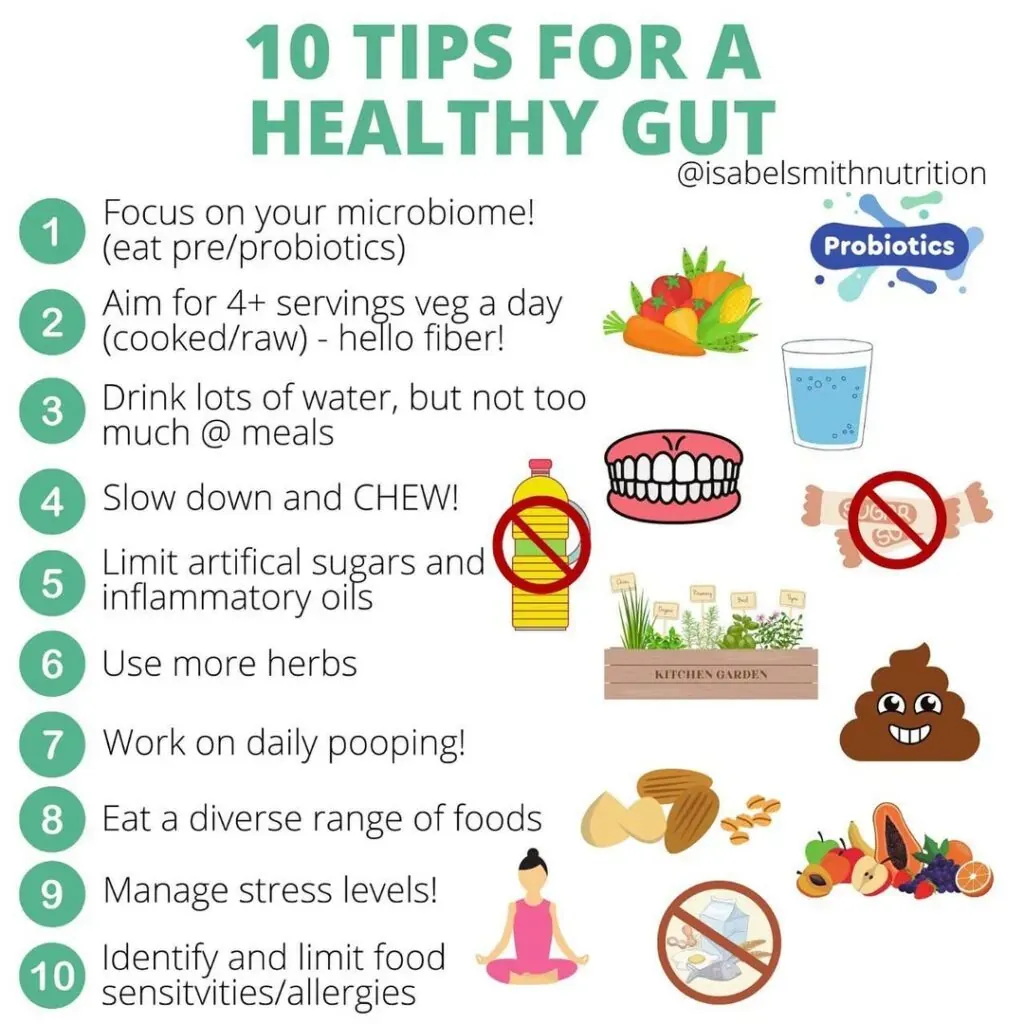How to Improve Gut Health – Easy Daily Tips
How to Improve Gut Health – Gut health means choosing a lifestyle and diet that support the good bacteria in your intestines. The best way to do this is by consuming a wide variety of fruits, vegetables, legumes, and whole grains, which are rich in dietary fiber and serve as prebiotics to nourish beneficial bacteria. Incorporating fermented foods such as yogurt, kefir, kimchi, sauerkraut, and kombucha can add probiotics — live beneficial bacteria that aid in balancing the gut microbiome.
IG Credit:@veerahealth
Keeping well hydrated by drinking enough water helps to nurture the gut lining and the transit of food through the intestinal tract. Limiting processed food, refined sugar, as well as artificial sweeteners can inhibit bad bacteria. It’s also important to get rid of stress, too, whether that’s through meditation or yoga or even exercise, since stress can wreak havoc on digestion and gut flora (this goes for chronic stress as well). Finally, sleeping well and not needlessly taking antibiotics will help maintain a functioning gut. These small but permanent changes make a big difference in digestive function and overall health and vitality.
How to Improve Gut Health Naturally
Eat a Diet Rich in Fiber
- Using high doses of prebiotic fiber, which you get by eating plenty of whole fruits, vegetables, legumes, seeds, and whole grains, helps to feed the good bacteria in the gut, facilitates bowel movements, and trains the gut to maintain a balance.
Incorporate Probiotic-Rich Foods
- Eating fermented foods like yogurt, kefir, sauerkraut, kimchi and miso adds live, active culture bacteria to your gut and can benefit its microflora, fight inflammation, and aid in digestion.
Stay Hydrated Throughout the Day
- Adequate water consumption keeps the mucosal lining of the intestines intact, and it may also make the food easier to pass through the intestines and work to help prevent constipation and bloating.
Avoid Processed Foods and Added Sugars
- It is important to reduce the intake of chocolates, fried items, and processed foods, as these foods can promote bacterial growth, disturb the gut composition and raise the likelihood of inflammation.
Manage Stress Levels Effectively
- It also means practicing stress-reducing activities like meditation, yoga, deep breathing exercises, or spending time outdoors to regulate the gut-brain axis (because chronic stress disrupts digestion and gut flora as well).
Exercise Regularly and Stay Active
- Regular, moderate exercise such as walking, cycling or swimming a few times a week can help maintain a healthy gut microbiome (commensal gut microbes) and digestion and support immune system function (ideally by supporting gut-associated lymphoid tissue [GALT] function).
Get Enough Quality Sleep
- It is paramount to target 7–9 hours of sound sleep per night as lack of sleep disturbs gut flora, the imbalance of which can precipitate digestive issues and weak immunity.
Avoid Overuse of Antibiotics
- And using antibiotics only as a last resort because antibiotics destroy all the bacteria in the gut (including beneficial bacteria), causing an imbalance in your gut microbiome and triggering digestive issues.
Consider Probiotic and Prebiotic Supplements
- Assuming your diet is deficient, proper supplementation with a strong probiotic and prebiotic can balance good bacteria, promote digestion, and provide microbial diversity within the gut.
Incorporate Gut-Healing Foods such as Bone Broth and Ginger
- Bone broth, ginger and anti-inflammatory foods work to heal the gut lining, reduce inflammation and support absorption and gut health, which in turn improves overall health.
IG Credit:@isabelsmithnutrition
What’s the best food for Gut Health
A: This means that fermented foods like yogurt, kefir, sauerkraut, and kimchi are the best gut health foods. Also, non-starchy high fiber foods like bananas, apples, oat,s and leafy greens are prebiotics too and nourish the beneficial microbes, helping the digestive system to operate efficiently.
What’s the best Drink for Gut Health
A: Kefir: The Top Gut-Healing Beverage Kefir is a fermented milk beverage rich in probiotics, providing diverse bacteria and yeasts that promote gut health. You can also drink kombucha, green tea, and bone broth, as well — these beverages can help restore the balance of the microbiome, reduce inflammation, and maintain the proper balance of the health of the intestinal lining.
What’s the best diet for Gut Health
A: A fiber-filled, plant-based diet with the regular incorporation of fermented foods is the best diet for gut health. Eating lots of prebiotic fiber, such as fruits, vegetables, legumes, whole grains, nuts, and seeds, as well as probiotic-rich foods such as yogurt, kefir, kimchi, and sauerkraut. Avoiding processed foods, highly refined sugars, and too much alcohol also goes a long way to keeping the gut content.
What to eat for Gut Health when taking antibiotics
A: During antibiotic therapy, it is important to consume probiotic foods such as yogurt, kefir and miso (live bacteria) and prebiotic foods such as garlic, bananas, and onions (to feed the bacteria). Combine these with plenty of high-fiber fruits, vegetables, and whole grains to aid in digestion and repopulation of the gut microbiome.
What to eat for Gut Health and weight loss
Stick to high-fiber foods for gut health and weight loss; things like leafy green vegetables, beans, lentils, chia seeds, and berries will keep your stomach fuller for longer and make sure your digestive system is functioning well. Add low glycemic foods such as eggs and good types of protein sources and probiotic foods such as kefir, kimchi, and sauerkraut, which help to boost metabolism while maintaining a healthy gut flora level.
What to eat for Gut Health and bloating
A: These foods include low-FODMAP, highly digestible foods that support gut health, such as zucchini, spinach, cucumber, oats, and rice, to decrease bloating but encourage gut healing. Incorporate probiotic foods such as yogurt and kefir that are good for digestion, while ginger, peppermint tea, and bone broth soothe the digestive tract. Stay away from processed foods and artificial sweeteners, which will exacerbate your bloating.


